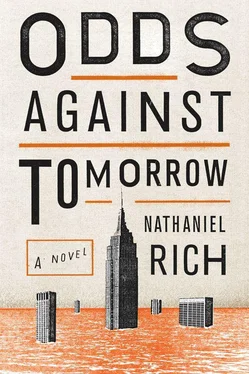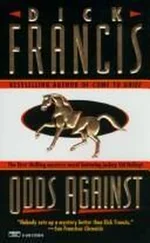“There are waves,” he said. “Coming up Third Avenue.”
Jane knelt next to him, hip to hip. They looked together through the section of glass. Obscure objects bobbed in the water like fallen logs, before being dragged beneath the surface.
The lightning sizzled again. Embedded in the foaming arc of a wave was, unmistakably, a black baby grand piano. There was a rending, creaking sound as some crucial structural brace peeled off a building and cartwheeled over the rooftops.
Neither of them dared to move. Their heads touching, their bodies pressed together, they waited. Beneath the eruptions outside the window, Mitchell could hear Jane’s slow intake of breath. Her shoulders rose and fell, rose and fell.
A jagged streak of lightning flashed very close by, and in that instant he could see a red blur flying through the air straight at them. They fell backward, shielding their faces as the brick crashed into the window. There was a small explosion of glass, then a burst of mist, and the rain started to spray into the apartment.
“Jane?”
She lay next to him, her arms covering her face. She started to tremble, and then she hiccuped.
Mitchell touched her shoulder. “Are you hurt?”
Jane flung back her arms, and all at once her peculiar melodious scale-climbing laughter filled the room. She started to brush the broken glass off her sweater, but that only made her laugh harder, and Mitchell laughed too — more out of shock than anything else. Still laughing, Jane flopped her leg over Mitchell’s waist and sat on top of him. She flung off her sweater, casting shards of glass across the parquet floor. She unbuckled her jeans; she found his hand and put it on her breast. When she lowered her face to meet Mitchell’s, her laughter stopped.
Then the only noise was the storm throwing itself against the wall.
1.
He was standing on a cliff after a storm. Waves fell gently against the shore, a vaporish drizzle fell on the rocks, the air was shivery and moist. The seagulls were starting to return, searching, with forlorn chirps, for their lost friends. Then a mechanized stentorian voice, amplified by a loudspeaker, interrupted.
“If you are safe and secure and have enough food and water for the next twenty-four hours, please remain where you are. If you are hurt or in danger, please call out. This is the United States Coast Guard. Is anyone in danger? Is anyone in danger?”
Mitchell made his way gingerly across the living room to the window, circling a huge puddle flecked with needles of broken glass. Though the hole in the window he peered out at a new world.
It wasn’t quite dawn. The sun touched lightly upon the balustrade of the tenement buildings across the street. Most of the windows were shattered or blown out entirely; one had been plugged with a waterlogged queen-size mattress. A white spotlight advanced north along the river that was once, very long ago, Third Avenue. The waters of the flood were upon the earth.
He suddenly felt as if everything that happened before that moment had been a dream, but this world into which he’d awoken — this was real.
He looked at Jane — she was asleep on the floor, partially covered by his shirt. Her head was pressed into the hollow of her shoulder; her mouth was slack; her hand was outstretched, grasping for something just out of reach. Most people look peaceful when they sleep. Jane looked as if she’d been knocked over the head.
The Coast Guard patrol boat drifted into view. Its searchlight fanned across the width of the avenue, picking up a car, a half-submerged couch, the piano, and bloated, humped shapes the color of oyster meat. These last Mitchell feared were bodies. An officer leaned over the side of the boat, a grappling hook in hand.
“Is anyone in danger?” asked the man through the loudspeaker.
The grappling hook snagged something heavy in the water. With a grunt the man hauled his catch onto the boat. When the spotlight passed over the deck, Mitchell saw a pair of jeans, a clump of black hair, a puckered blue arm.
He started frantically to remove the tape and the slats over the broken window. They couldn’t come off fast enough. Once the opening was large enough he put his mouth to it and yelled.
“Up here! Up here! Hey! Help!”
But the boat had passed.
Jane was moving behind him. Before he could say anything, she was running into his bedroom, carrying her clothes, covering her body as best as she could. The door clicked shut behind her. Mitchell threw a towel over the puddle and found his Go Bag in the closet. He turned the transistor radio to the NOAA All Hazards station. Static kept interrupting the broadcast, but he could make out “massive flooding … known dead … preliminary … hundreds of thousands still unaccounted for, though many are hoped … no electricity for at least a week … damages that are already approaching … fog, calm, overcast…”
Beyond his little apartment, beyond the shard of city visible from his window, something vast and nameless had happened — and was, to some extent, still happening. Yet as scary as the news was, the measured tone of the reporter’s voice gave the tragedy an eerie semblance of normality. Switching on the radio, Mitchell had expected to hear inchoate wailing, the brass of crashing machinery, the rush of cascading water. But even a catastrophe of this proportion, it turned out, could be described in simple English — word after word, sentence after sentence. A barbaric nausea passed over him. The storm was being discussed in the same way that one might recount the highlights of a ball game, a summit meeting between prime ministers, a recipe for butternut squash. Chaos was seeping under the cracks of doors and through the seams in the carpentry, wrathful Kali was dancing at the door, the Valkyries were hurtling through the air with flashing spears, chanting their death hymns — yet somehow a story could still be told. Even on the precipice of hell, here was introduction, thesis, cliff-hanger, conflict, resolution. Somewhere in the world, possibly as close as Newark, there existed a radio studio in which a woman sat at a desk wearing a business suit; makeup, perhaps. Set before her, a printed script and a pen, a computer screen logging minute-by-minute updates. Staff members tested the microphones, wrote copy, balanced the sound frequencies, received reports from journalists flying over the wreckage in helicopters. Just another Thursday morning: microphone check one two three four.
“There’s something wrong with your pipes.”
Jane emerged from Mitchell’s bedroom in her jeans and T-shirt, her hair pulled back, her face still puffy from sleep. “I’m going home. I want to make sure my computer didn’t get totally drenched.” She began to move toward the door.
“What?”
She walked past him.
“I don’t think you understand,” he said. “The city is flooded. Look outside.”
She squinted at him. Mitchell, suddenly aware that he was wearing nothing but his boxer shorts, slipped quickly into his room and pulled over his head a ratty old T-shirt he’d made in high school. When he emerged again, Jane was at the window. As if doing him a favor, she bent to look through the window.
“Oh.” She hiccuped loudly. “My goodness.”
Mitchell started picking through his Go Bag.
“Ten snack bars, a gallon of bottled water, three cans of red beans, two boxes of animal crackers. There’s a can of tuna in my cupboard, and three bottles of lemon-lime Gatorade. Maybe a beer or two. Mustard, ketchup.” He walked into the kitchenette and opened the refrigerator door. “And a small plastic container of coleslaw from a deli sandwich I ordered last week. That’s probably turned, though.” He opened the lid and sniffed. “Yeah. It turned.”
Читать дальше












